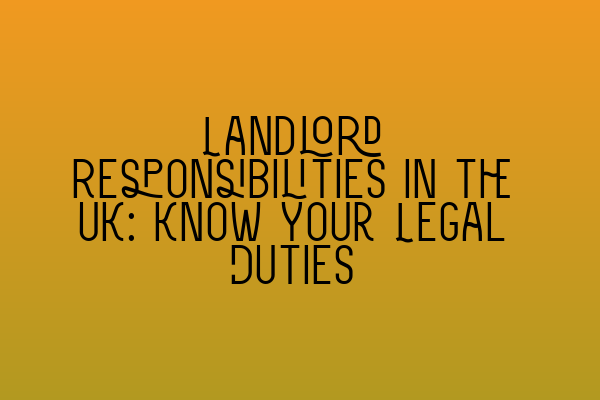Landlord Responsibilities in the UK: Know Your Legal Duties
As a landlord in the UK, it’s important to understand your legal duties and responsibilities. Failing to comply with these obligations can result in serious consequences such as financial penalties, legal disputes, and damage to your reputation. In this blog post, we will outline the key landlord responsibilities and provide you with the necessary information to ensure you fulfill your obligations.
1. Providing a Safe and Habitable Environment
One of the primary responsibilities of a landlord is to provide a safe and habitable environment for tenants. This includes ensuring that the property meets all relevant health and safety standards. It is important to conduct regular inspections and maintenance to address any potential hazards or issues that may compromise the safety of your tenants.
Additionally, landlords must comply with all relevant building and fire safety regulations. This includes installing smoke alarms, carbon monoxide detectors, and providing proper fire escape routes. Failure to meet these requirements can lead to severe consequences, including legal action.
To learn more about the legal standards for rental properties, you can check out this link: SQE 1 Practice Exam Questions.
2. Tenancy Agreements and Deposits
Another crucial responsibility as a landlord is to provide tenants with a written tenancy agreement that outlines the terms and conditions of the tenancy. A tenancy agreement helps protect both parties and ensures clear communication and understanding of their rights and obligations.
Furthermore, landlords are required to protect tenants’ deposits in a government-approved tenancy deposit scheme. This ensures the fair and proper handling of deposits, and protects the tenant’s rights to recover their deposit at the end of the tenancy. Failure to comply with deposit protection requirements can result in penalties and legal disputes.
If you need assistance with drafting a tenancy agreement or understanding deposit protection regulations, you can find helpful resources here: SQE 1 Practice Mocks FLK1 FLK2.
3. Repairs and Maintenance
Ensuring that the property is well-maintained and in good repair is another key responsibility for landlords. You are legally obligated to address any necessary repairs promptly and efficiently. It is important to maintain open lines of communication with your tenants to address any maintenance issues promptly.
Regular property maintenance not only keeps your tenants satisfied, but it also helps prevent further damage and deterioration. Neglecting to carry out necessary repairs can result in legal action from tenants and potential fines from local authorities.
If you need guidance on property maintenance or want to understand how to fulfill your repair responsibilities, you may find this resource helpful: SQE 2 Preparation Courses.
4. Gas, Electrical, and Energy Performance Certificates
Landlords are required to provide gas safety certificates to their tenants, ensuring that all gas appliances and installations are safe and regularly maintained. Similarly, electrical safety is crucial, and landlords must ensure that all electrical systems and appliances are safe for use. Obtaining an Electrical Installation Condition Report (EICR) can help ensure compliance with electrical safety regulations.
Furthermore, landlords should also obtain an Energy Performance Certificate (EPC) for the property, which provides information on the energy efficiency of the property. This helps tenants make informed decisions about the energy costs associated with their rental property, and it is a legal requirement.
If you want to know more about these certificates and how to obtain them, you can check out the following link: SQE 1 Preparation Courses.
5. Anti-Discrimination Laws
As a landlord, it is important to be aware of and comply with anti-discrimination laws. It is illegal to discriminate against tenants based on their race, religion, nationality, gender, disability, or other protected characteristics. Landlords must treat all tenants fairly and not impose any unfair conditions or requirements.
To ensure compliance with anti-discrimination laws and understand your responsibilities, this resource can provide further guidance: SRA SQE Exam Dates.
In Conclusion
Understanding your legal duties as a landlord is vital for maintaining a successful and ethical property rental business. By providing a safe and habitable environment, complying with tenancy agreement and deposit protection regulations, prioritizing repairs and maintenance, obtaining necessary certificates, and adhering to anti-discrimination laws, you can establish yourself as a responsible and reliable landlord.
For additional guidance and information on landlord responsibilities, you can consult our team of experts at SQE Property Law & Land Law. We offer a range of services to support you in fulfilling your obligations as a landlord.
